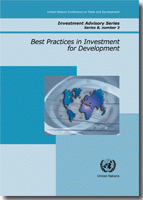
UNCTAD´s Investment Advisory Series B entitled "How to Attract and Benefit from FDI in Mining: Lessons from Canada and Chile" focuses on identifying policies that successfully attract foreign direct investment (FDI) in mining, while optimizing its economic, environmental and social impacts. This study focuses on two cases, Canada and Chile, and identifies how they have addressed the challenges in balancing the interests of foreign investors and those of the host country.
Canada and Chile have attracted high levels of FDI to their respective mining industries. With some exceptions, they have secured significant economic benefits from these investments while limiting their environmental and social costs. Doing so has meant finding the appropriate balance between, on one hand, an attractive policy environment for mining TNCs and, on the other, tax and regulatory requirements that hold these companies accountable to the country´s development goals.
The Report draws lessons from the experience of these two countries on how to improve supply side factors affecting mining investment, how to ensure policy stability, how to tax the mining industry, how to encourage industry efficiency and local enterprise development and how to improve environmental and social impact of mining.
The study concludes that policies to promote positive impact of FDI in mining include:
- Supporting the public availability of geological data and enhance these databases through public investment and the encouragement of private exploration.
- Proactively addressing the water, energy and transportation needs of major mines through high-level interaction between the government and the industry.
- Using policy instruments that assure foreign investors of regime stability, including constitutional guarantees of property rights and security of tenure, tax and regulatory stability contracts with the state, and international investment agreements and the use multi-stakeholder consultations to create social and political consensus on general direction of mining policy.
Countries may also consider geological features affecting profitability when setting tax regime, rely on the capabilities of global mining TNCs for mineral production, ensure that mineral title and concession laws facilitate competitive mineral development, and assist the efforts of TNCs to develop local workforce and supplier capabilities, and facilitate the development of mining clusters.
Other policies identified that have rendered positive results in this sector include requiring comprehensive environmental impact assessments (EIAs) for project approval and ensure government follow-up on commitments by project developers, implementing a legal framework that protects the rights of local communities and ensures their participation in mineral development and incorporating TNCs with leading environmental and social practices into private sector organizations and government policy processes.
Although these lessons cannot be generalized to all situations as there is no "one-size-fits-all" model of mining industry development, they serve as useful guidelines and present policy options that should be adjusted according to specific contexts and constraints.


